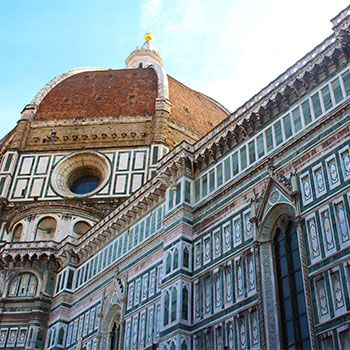The Value of Art: Art Management and Marketing
Business & Marketing Program
Florence, Italy
Dates: 9/2/25 - 12/20/25

The Value of Art: Art Management and Marketing
OVERVIEW
CEA CAPA Partner Institution: CEA CAPA Florence Center
Location: Florence, Italy
Primary Subject Area: Business
Instruction in: English
Course Code: BUS382FLR
Transcript Source: University of New Haven
Course Details: Level 300
Recommended Semester Credits: 3
Contact Hours: 45
Prerequisites: Prior to enrollment, this course requires you to have completed either one 200-level course or two 100-level courses in any of the following subject areas: Marketing or Management.
Additional Fee: $130.00
Additional Fee Description:This course requires payment of an additional fee to cover active learning components that are above and beyond typical course costs, such as site visits, entrance fees and other expenses.
DESCRIPTION
This course investigates the value of art and the ways it has created profit from the past up to the present. Additionally it explores how art is marketed, sold, used, consumed, showcased and managed and how contemporary societies and nations (as the United Arab Emirates) see it as a new profitable sector for the economy of the state.
It departs from the logical question: what is art in the first place and how is it turned into money? Furthermore, in today's society, how does art define the lifestyle and identity of individuals? How does it add to social visibility or economic well-being? What is the business that artists make? Who are their agents? What happens to an art-work today?
As a powerful form of human expression, art has always been produced for multiple reasons and to various ends. However, beyond its significance as a visual record of our cultural history and the aesthetic appreciation it elicits, art has always been an investment. In the contemporary world, with an established collectors' market, the greater availability of visual culture and mass tourism on the increase, art has become a major business and a financial resource. Taken out of their context and moved into museums, old-masters are divested of their original meaning and have acquired a different purpose and a greater availability. Yet artworks are also privately collected, newly produced or re-produced, thus creating new profits, businesses and agendas, as well as new settings in which contemporary society moves.
Issues of art management, art business, marketing and financial value as well as creativity, taste and patronage will be addressed in the very contexts where art is produced and consumed. Specific case studies and on-site lectures will further add to an understanding of business practices related to the art world. What, then, is the value of art? What leads individuals to spend astronomical sums to possess a particular piece? What attracts hordes of visitors to the Uffizi Gallery in Florence or the Sistine Chapel in Rome? Is art a commodity? If so what kind of art is produced today? These and other questions will be raised. Artists and art-professionals, art-historians, curators, gallerists, auctioneers, collectors, art-critics and the students themselves will provide the answers.
It departs from the logical question: what is art in the first place and how is it turned into money? Furthermore, in today's society, how does art define the lifestyle and identity of individuals? How does it add to social visibility or economic well-being? What is the business that artists make? Who are their agents? What happens to an art-work today?
As a powerful form of human expression, art has always been produced for multiple reasons and to various ends. However, beyond its significance as a visual record of our cultural history and the aesthetic appreciation it elicits, art has always been an investment. In the contemporary world, with an established collectors' market, the greater availability of visual culture and mass tourism on the increase, art has become a major business and a financial resource. Taken out of their context and moved into museums, old-masters are divested of their original meaning and have acquired a different purpose and a greater availability. Yet artworks are also privately collected, newly produced or re-produced, thus creating new profits, businesses and agendas, as well as new settings in which contemporary society moves.
Issues of art management, art business, marketing and financial value as well as creativity, taste and patronage will be addressed in the very contexts where art is produced and consumed. Specific case studies and on-site lectures will further add to an understanding of business practices related to the art world. What, then, is the value of art? What leads individuals to spend astronomical sums to possess a particular piece? What attracts hordes of visitors to the Uffizi Gallery in Florence or the Sistine Chapel in Rome? Is art a commodity? If so what kind of art is produced today? These and other questions will be raised. Artists and art-professionals, art-historians, curators, gallerists, auctioneers, collectors, art-critics and the students themselves will provide the answers.







